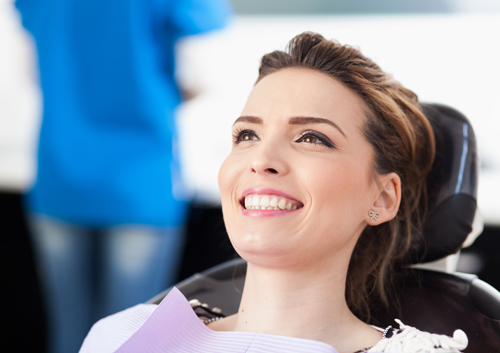
Keeping your smile its brightest can be a challenge! The foods you eat, healthy habits, unhealthy habits, and time itself can affect the color of your enamel. Luckily, there are some everyday actions you can take to minimize staining and discoloration.
Some of our favorite foods and beverages cause some of the most noticeable staining. Even though enamel is the strongest substance in our bodies, it’s still porous. This means that enamel can absorb elements from our foods, including tannins and natural food colors, which darken teeth over time.
That’s why a daily cup of coffee or tea, or a glass of red wine with dinner, or frequent helpings of dark berries, can lead to a less than brilliant smile in a matter of months. What’s more, acidic foods like citrus fruits, pickled foods, and sodas erode the enamel surface, which makes it easier for food stains to penetrate.
When you eat those smile-dimming foods, it’s a good idea to rinse with water right away. (When tasty treats are acidic, it’s best to wait to brush for about half an hour to avoid enamel damage.) And here’s a simple work-around—use a straw when you enjoy discoloring drinks.
You can also reduce staining by adding food allies to your diet. Besides bringing you the nutritional benefits of a healthy, well-balanced diet, crunchy foods such as apples, carrots, and celery can have a mild scrubbing effect on the tooth surface, and dairy foods strengthen enamel and might help prevent staining when added to coffee or tea.
If you’re mindful of your eating habits, you’ll help your smile stay its brightest. And speaking of habits . . .
- Keep Up with Healthy Habits
Plaque is a sticky biofilm which contains oral bacteria, food particles, saliva, and fluids. This film starts forming within hours after brushing, and a buildup of plaque leaves teeth looking yellowish. If plaque is left undisturbed, it hardens into tartar within days. And the yellow and brown colors of tartar aren’t a flattering look for any of us.
Regular brushing and flossing is the best way to keep your teeth plaque-free. For a brighter smile, a whitening toothpaste can help remove superficial surface stains. But what a whitening toothpaste can’t do is to remove deep staining or tartar.
A professional cleaning every time you have a checkup at our Naples, FL office is the best way to keep your teeth their cleanest, especially because tartar must be removed by a dental professional. And please feel free to ask for brushing and flossing tips to help maintain your sparkling smile.
Cigarettes, cigars, and other forms of tobacco are terrible for your health and terrible for your smile. While cosmetic concerns are the least of our worries when it comes to tobacco, it’s well known that smoking and chewing tobacco cause unattractive yellow and brown staining.
Quitting tobacco in any form benefits not just your appearance, but your oral health—and your overall health. When you’re ready, talk to Dr. Vincent Cardinale and Dr. Chris Moody about some of the methods you can use to give up the habit permanently.
Over the years, erosion and wear cause the enamel layer on the outside of the tooth to thin or crack. This allows the dentin underneath to show through. Because dentin is darker than enamel to begin with, and gets darker over time, teeth can take on a yellow or grey hue as we age.
Keep your smile looking its best through the years with regular checkups and cleanings. Avoid excessive erosion and abrasion by being mindful of the acidic foods in your diet, using a soft-bristled brush for cleaning your teeth, and getting treatment for harmful conditions like bruxism (tooth grinding). If you notice any changes in your smile, it’s a good idea to talk to Dr. Vincent Cardinale and Dr. Chris Moody.
While preventing staining naturally with diet and healthy habits is great, sometimes nature needs a nudge. If you have an important event coming up, or if you would simply like to feel more confident about your smile, talk to us about professional whitening. A professional treatment uses a stronger whitening formula, and often works more quickly, is more effective at removing yellowing and stains, and lasts longer than home treatments.
Finally, while you can do a lot to keep your teeth their brightest by preventing and treating external staining, other types of discoloration can also affect your teeth. For staining caused by medication, root canal work, or trauma, ask us about all the options available to you.
Yes, keeping your teeth their brightest can be a challenge, but doing your part—and working with your dental team at Cardinale Dentistry—will make sure you greet the world with a sparkling, confident smile.





